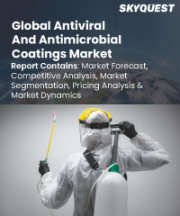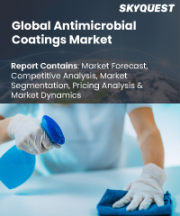
|
시장보고서
상품코드
1824133
무기 항균 첨가제 시장 : 유형, 용도, 최종사용자, 지역별 - 시장 규모, 산업역학, 기회 분석, 예측(2025-2033년)Global Inorganic Antimicrobial Additives Market: By Type, Application, End Use, Region- Market Size, Industry Dynamics, Opportunity Analysis and Forecast for 2025-2033 |
||||||
세계의 무기 항균 첨가제 시장은 빠르게 성장하고 있으며 시장 규모는 2024년 약 75억 달러에 달했습니다. 이 역동적인 분야는 앞으로도 확대가 계속될 것으로 전망되고 있으며, 2033년까지 규모는 거의 2배가 되어 약 139억 달러에 달할 것으로 예측되고 있습니다. 2025년부터 2033년까지 예측기간 중 CAGR은 7.01%로 나타나 다양한 산업분야에서 항균 첨가제에 대한 수요와 광범위한 채용 증가를 부각하고 있습니다.
이 강력한 성장 뒤에 있는 주요 추진 요인은 위생에 대한 세계적인 의식 증가와 미생물 오염을 방지하는데 항균 화합물이 하는 중요한 역할입니다. 소비자, 기업 및 규제 당국 모두가 특히 세계적인 건강 문제가 높아지는 가운데 청결과 감염 관리를 그 어느 때보다도 중시하고 있습니다. 이러한 의식이 높아짐에 따라 다양한 제품과 용도에 통합할 수 있는 효과적인 항균 솔루션에 대한 수요가 늘어나고 있습니다.
주요 성장 요인
무기 항균 첨가제 시장 수요는 CE 제품 부문에 의해 점점 형성되고 있습니다. 여기에서는 위생이 구매 결정에 영향을 미치는 중요한 요소입니다. 소비자가 보다 건강 지향이 됨에 따라, 청결하고 안전한 전자기기에 대한 기대가 높아지고, 제조업체는 혁신을 진행해, 제품에 항균 특성을 짜넣게 되고 있습니다. 이러한 변화는 미생물 오염으로 인해 건강 위험을 초래할 수 있는 스마트폰, 리모컨 및 기타 자주 만지는 가젯과 같은 고접촉 장치에서 특히 두드러집니다. 이 추세를 인식한 주요 코팅 제조업체는 이러한 전자 장비 표면의 특정 요구 사항을 충족하도록 설계된 특수 처방을 개발합니다.
새로운 기회 동향
현재 자동차 부문에서 큰 변화가 진행되고 있으며 무기 항균 첨가제 시장의 주요 성장 요인으로 부상하고 있습니다. 특히 세계적인 건강 위기 이후, 위생과 안전에 대한 소비자의 의식과 관심이 높아지고, 차내에서의 청결과 안전에 대한 기대가 높아지고 있습니다. 이러한 수요 증가는 자동차 인테리어, 특히 운전자와 승객이 자주 만지는 고접촉 표면에 항균 첨가제를 채택하는 것을 가속화하고 있습니다. 한때는 호화로운 기능으로 여겨졌던 것이 지금 건강 지향 구매자에게 미생물 오염을 최소화하고 편안함을 높이는 환경을 우선하는 표준적인 요건이 되고 있습니다.
최적화를 방해하는 요인
최근 무기 항균 첨가제 시장의 제조업체는 생산에 필수적인 원재료 비용 상승과 변동으로 인해 큰 문제에 직면해 있습니다. 특히 영향이 큰 것은 강력한 항균 특성을 가진 은이나 구리 등 주요 금속의 가격 변동입니다. 이 금속은 많은 무기 첨가제의 핵심을 이루고 있으며, 가격의 불안정성은 직접 생산비 증가로 이어집니다. 게다가 제조 공정에 필수적인 에너지 비용의 상승이 전체적인 조업 경비를 밀어 올려 이러한 과제를 더욱 악화시키고 있습니다.
본 보고서에서는 세계의 무기 항균 첨가제 시장을 조사했으며, 시장 개요, 시장 성장에 대한 각종 영향요인 분석, 시장 규모 추이와 예측, 각종 구분별 상세 분석, 경쟁 구도, 주요 기업 프로파일 등을 정리했습니다.
목차
제1장 조사 프레임워크
- 조사 목적
- 제품 개요
- 시장 세분화
제2장 조사 방법
제3장 주요 요약 : 세계의 무기 항균 첨가제 시장
제4장 세계의 무기 항균 첨가제 시장 개요
- 밸류체인 분석
- 산업의 전망
- PESTLE 분석
- Porter's Five Forces 분석
- 시장 역학 및 동향
- 성장의 원동력
- 억제요인
- 기회
- 주요 동향
- 시장 성장 동향에 대한 COVID-19의 영향 평가
- 시장의 성장과 전망
- 수익추계 및 예측
- 시장 규모의 추정 및 예측
- 가격 분석(유형별)
- 경쟁 대시보드
- 시장 집중률
- 기업 점유율 분석
- 경쟁 매핑
제5장 세계의 무기 항균 첨가제 시장 : 유형별
- 중요한 통찰
- 시장 규모와 예측
- 은
- 구리
- 아연
제6장 세계의 무기 항균 첨가제 시장 : 용도별
- 중요한 통찰
- 시장 규모와 예측
- 플라스틱
- 페인트 및 코팅
- 펄프 및 종이
- 기타
제7장 세계의 무기 항균 첨가제 시장 : 산업별
- 중요한 통찰
- 시장 규모와 예측
- 헬스케어
- 패키지
- 식음료
- 건설
- 자동차
- 소비재
- 섬유
- 기타
제8장 세계의 무기 항균 첨가제 시장 분석 : 지역별
- 중요한 통찰
- 시장 규모와 예측
- 북미
- 유럽
- 아시아태평양
- 중동 및 아프리카
- 남미
제9장 북미의 무기 항균 첨가제 시장 분석
제10장 유럽의 무기 항균 첨가제 시장 분석
제11장 아시아태평양의 무기 항균 첨가제 시장 분석
제12장 중동 및 아프리카의 무기 항균 첨가제 시장 분석
제13장 남미의 무기 항균 첨가제 시장 분석
제14장 기업 프로파일
- BASF SE
- DuPont De Nemours
- Microban International
- Sanitized AG
- LyondellBasell
- Avient Corporation
- Biocote
- Milliken Chemical
- Dow Inc.
- Clariant AG
- Lonza
- Plastics Color Corp.
- Biosafe Inc.
- 기타 주요 기업
The inorganic antimicrobial additives market is experiencing rapid growth, with its valuation reaching approximately US$ 7.5 billion in 2024. This dynamic sector is poised for continued expansion, as market forecasts project its value to nearly double to US$ 13.9 billion by 2033. This growth corresponds to a compound annual growth rate (CAGR) of 7.01% during the forecast period from 2025 to 2033, highlighting the increasing demand and widespread adoption of antimicrobial additives across various industries.
A key driver behind this robust growth is the rising global awareness of hygiene and the critical role that antimicrobial compounds play in preventing microbial contamination. Consumers, businesses, and regulatory bodies alike are placing greater emphasis on cleanliness and infection control, particularly in the wake of heightened health concerns worldwide. This heightened awareness is fueling demand for effective antimicrobial solutions that can be integrated into a broad range of products and applications.
Noteworthy Market Developments
The inorganic antimicrobial additives market in 2024 is characterized by the active presence of at least 13 key players, whose contributions are driving innovation and expanding the range of available products. This competitive landscape fosters ongoing technological advancements as companies strive to develop more effective and versatile antimicrobial solutions. Among these industry leaders, BASF SE, DuPont De Nemours, Microban International, Avient Corporation, Dow Inc., Clariant AG, and Lonza stand out as the top seven players, collectively commanding around 35% of the global market share.
BASF SE and DuPont hold particularly influential roles within the market, often regarded as frontrunners in shaping the direction of inorganic antimicrobial additive technologies worldwide. Their leadership is underpinned by robust innovation pipelines and a commitment to meeting diverse industry needs through high-performance antimicrobial solutions. These companies continuously introduce new formulations that address evolving challenges such as antimicrobial resistance, environmental regulations, and application-specific requirements.
Core Growth Drivers
Demand within the inorganic antimicrobial additives market is increasingly shaped by the consumer electronics sector, where hygiene has emerged as a critical factor influencing purchasing decisions. As consumers become more health-conscious, the expectation for clean and safe electronic devices has intensified, prompting manufacturers to innovate and incorporate antimicrobial properties into their products. This shift is particularly evident in high-touch devices such as smartphones, remote controls, and other frequently handled gadgets, where microbial contamination can pose health risks. Recognizing this trend, major coatings manufacturers have developed specialized formulations designed to meet the unique requirements of these electronic surfaces.
Emerging Opportunity Trends
A profound shift is currently transforming the automotive sector, emerging as a major driver for growth in the inorganic antimicrobial additives market. Increasing consumer awareness and concern about hygiene, particularly in the wake of global health crises, have elevated expectations for cleanliness and safety within vehicle cabins. This rising demand has accelerated the adoption of antimicrobial additives in automotive interiors, especially on high-contact surfaces that are frequently touched by drivers and passengers. What was once considered a luxury feature has now become a standard requirement for health-conscious buyers who prioritize environments that minimize microbial contamination and promote well-being.
Barriers to Optimization
In recent years, manufacturers in the inorganic antimicrobial additives market have faced significant challenges due to the rising and fluctuating costs of raw materials essential for production. Among the most impactful factors are the volatile prices of key metals such as silver and copper, which are widely used for their potent antimicrobial properties. These metals form the backbone of many inorganic additives, and any price instability directly translates into increased production expenses. The rising cost of energy, which is crucial for manufacturing processes, further compounds these challenges by driving up operational expenditures across the board.
Detailed Market Segmentation
By Type, zinc holds a commanding 42.10% share of the inorganic antimicrobial additives market, reflecting its strong position as a preferred antimicrobial agent across diverse industries. This dominance is a result of zinc's unique combination of broad-spectrum antimicrobial efficacy, widespread regulatory acceptance, and cost-effectiveness. Zinc compounds, particularly zinc oxide, have demonstrated potent activity against a wide range of bacterial and fungal species, making them highly versatile in combating microbial contamination in various applications.
By Application, plastics constitute the largest application segment within the inorganic antimicrobial additives market, accounting for over 39% of the total market share. This significant dominance is largely attributable to the widespread use of plastics across countless industries and products in modern manufacturing. Given their versatility, cost-effectiveness, and durability, plastics are integral to everything from consumer goods and packaging to medical devices and automotive components. However, despite their many advantages, plastics are inherently vulnerable to microbial colonization, which poses a substantial challenge in maintaining the quality and longevity of plastic products.
By End-User, the healthcare sector emerges as the largest end-user in the inorganic antimicrobial additives market, accounting for more than 28.10% of the market's total revenue. This dominant position is intricately tied to the global efforts to combat healthcare-associated infections (HAIs), which remain a persistent and costly challenge for medical facilities worldwide. HAIs not only endanger patient safety but also impose significant financial burdens due to extended hospital stays, additional treatments, and increased resource utilization. As a result, healthcare providers and manufacturers prioritize the integration of antimicrobial additives as a critical strategy to prevent the spread of infections within clinical environments.
Segment Breakdown
By Type
- Silver
- Copper
- Zinc
By Application
- Plastic
- Paints & Coatings
- Pulp & Paper
- Others
By End User
- Healthcare
- Packaging
- Food & Beverage
- Construction
- Automotive
- Consumer Goods
- Textiles
- Others
By Region
- North America
- The U.S.
- Canada
- Mexico
- Europe
- The U.K.
- Germany
- France
- Italy
- Spain
- Poland
- Russia
- Rest of Europe
- Asia Pacific
- China
- India
- Japan
- South Korea
- Australia & New Zealand
- ASEAN
- Rest of Asia Pacific
- South America
- Brazil
- Argentina
- Rest of South America
- Middle East & Africa
- UAE
- Saudi Arabia
- South Africa
- Rest of Middle East & Africa
Geography Breakdown
- The Asia Pacific region commands the inorganic antimicrobial additives market, driven by its immense manufacturing scale and rapid urbanization. In 2024, China's production of silver-based additives is set to supply over 200 million square meters of antimicrobial coatings for infrastructure projects alone. India's burgeoning healthcare sector is a major consumer, with a 2025 government tender specifying the procurement of 5 million medical devices incorporating antimicrobial polymers. Japan continues to lead in high-tech applications, with 15 new consumer electronic product lines featuring antimicrobial casings launched in 2024.
- India's rapidly growing healthcare sector also contributes prominently to the demand for inorganic antimicrobial additives. The government's increasing focus on healthcare infrastructure and infection control is evident in a major tender announced for 2025, which calls for the procurement of 5 million medical devices embedded with antimicrobial polymers. This initiative highlights the critical role that antimicrobial additives play in enhancing the safety and effectiveness of medical equipment, particularly in a country where healthcare modernization is a top priority.
Leading Market Participants
- BASF SE
- DuPont De Nemours
- Microban International
- Sanitized AG
- LyondellBasell
- Avient Corporation
- Biocote
- Milliken Chemical
- Dow Inc.
- Clariant AG
- Lonza
- Plastics Color Corp.
- Biosafe Inc.
- Other Prominent Players
Table of Content
Chapter 1. Research Framework
- 1.1. Research Objective
- 1.2. Product Overview
- 1.3. Market Segmentation
Chapter 2. Research Methodology
- 2.1. Qualitative Research
- 2.1.1. Primary & Secondary Sources
- 2.2. Quantitative Research
- 2.2.1. Primary & Secondary Sources
- 2.3. Breakdown of Primary Research Respondents, By Region
- 2.4. Assumption for the Study
- 2.5. Market Size Estimation
- 2.6. Data Triangulation
Chapter 3. Executive Summary: Global Inorganic Antimicrobial Additives Market
Chapter 4. Global Inorganic Antimicrobial Additives Market Overview
- 4.1. Industry Value Chain Analysis
- 4.1.1. Material Provider
- 4.1.2. Manufacturer
- 4.1.3. Distribution
- 4.1.4. End Users
- 4.2. Industry Outlook
- 4.2.1. Recent Progress in the development of Antimicrobial Nanomaterials
- 4.3. PESTLE Analysis
- 4.4. Porter's Five Forces Analysis
- 4.4.1. Bargaining Power of Suppliers
- 4.4.2. Bargaining Power of Buyers
- 4.4.3. Threat of Substitutes
- 4.4.4. Threat of New Entrants
- 4.4.5. Degree of Competition
- 4.5. Market Dynamics and Trends
- 4.5.1. Growth Drivers
- 4.5.2. Restraints
- 4.5.3. Opportunities
- 4.5.4. Key Trends
- 4.6. Covid-19 Impact Assessment on Market Growth Trend
- 4.7. Market Growth and Outlook
- 4.7.1. Market Revenue Estimates and Forecast (US$ Bn), 2020 - 2033
- 4.7.2. Market Volume Estimates and Forecast ('000 MT), 2020 - 2033
- 4.7.3. Pricing Analysis, By Type
- 4.8. Competition Dashboard
- 4.8.1. Market Concentration Rate
- 4.8.2. Company Market Share Analysis (Value %), 2024
- 4.8.3. Competitor Mapping
Chapter 5. Global Inorganic Antimicrobial Additives Market, By Type
- 5.1. Key Insights
- 5.2. Market Size and Forecast, 2020 - 2033 (US$ Bn and '000 MT)
- 5.2.1. Silver
- 5.2.2. Copper
- 5.2.3. Zinc
Chapter 6. Global Inorganic Antimicrobial Additives Market, By Application
- 6.1. Key Insights
- 6.2. Market Size and Forecast, 2020 - 2033 (US$ Bn and '000 MT)
- 6.2.1. Plastic
- 6.2.2. Paints & Coatings
- 6.2.3. Pulp & Paper
- 6.2.4. Others
Chapter 7. Global Inorganic Antimicrobial Additives Market, By Industry
- 7.1. Key Insights
- 7.2. Market Size and Forecast, 2020 - 2033 (US$ Bn and '000 MT)
- 7.2.1. Healthcare
- 7.2.2. Packaging
- 7.2.3. Food & Beverage
- 7.2.4. Construction
- 7.2.5. Automotive
- 7.2.6. Consumer Goods
- 7.2.7. Textiles
- 7.2.8. Others
Chapter 8. Global Inorganic Antimicrobial Additives Market Analysis, By Region
- 8.1. Key Insights
- 8.2. Market Size and Forecast, 2020 - 2033 (US$ Bn and '000 MT)
- 8.2.1. North America
- 8.2.1.1. The U.S.
- 8.2.1.2. Canada
- 8.2.1.3. Mexico
- 8.2.2. Europe
- 8.2.2.1. Western Europe
- 8.2.2.1.1. The UK
- 8.2.2.1.2. Germany
- 8.2.2.1.3. France
- 8.2.2.1.4. Italy
- 8.2.2.1.5. Spain
- 8.2.2.1.6. Rest of Western Europe
- 8.2.2.2. Eastern Europe
- 8.2.2.2.1. Poland
- 8.2.2.2.2. Russia
- 8.2.2.2.3. Rest of Eastern Europe
- 8.2.2.1. Western Europe
- 8.2.3. Asia Pacific
- 8.2.3.1. China
- 8.2.3.2. India
- 8.2.3.3. Japan
- 8.2.3.4. South Korea
- 8.2.3.5. Australia & New Zealand
- 8.2.3.6. ASEAN
- 8.2.3.7. Rest of Asia Pacific
- 8.2.4. Middle East & Africa (MEA)
- 8.2.4.1. UAE
- 8.2.4.2. Saudi Arabia
- 8.2.4.3. South Africa
- 8.2.4.4. Rest of MEA
- 8.2.5. South America
- 8.2.5.1. Brazil
- 8.2.5.2. Argentina
- 8.2.5.3. Rest of South America
- 8.2.1. North America
Chapter 9. North America Inorganic Antimicrobial Additives Market Analysis
- 9.1. Key Insights
- 9.2. Market Size and Forecast, 2020 - 2033 (US$ Bn and '000 MT)
- 9.2.1. By Type
- 9.2.2. By Application
- 9.2.3. By End Use Industry
- 9.2.4. By Country
Chapter 10. Europe Inorganic Antimicrobial Additives Market Analysis
- 10.1. Key Insights
- 10.2. Market Size and Forecast, 2020 - 2033 (US$ Bn and '000 MT)
- 10.2.1. By Type
- 10.2.2. By Application
- 10.2.3. By End Use Industry
- 10.2.4. By Country
Chapter 11. Asia Pacific Inorganic Antimicrobial Additives Market Analysis
- 11.1. Key Insights
- 11.2. Market Size and Forecast, 2020 - 2033 (US$ Bn and '000 MT)
- 11.2.1. By Type
- 11.2.2. By Application
- 11.2.3. By End Use Industry
- 11.2.4. By Country
Chapter 12. Middle East & Africa Inorganic Antimicrobial Additives Market Analysis
- 12.1. Key Insights
- 12.2. Market Size and Forecast, 2020 - 2033 (US$ Bn and '000 MT)
- 12.2.1. By Type
- 12.2.2. By Application
- 12.2.3. By End Use Industry
- 12.2.4. By Country
Chapter 13. South America Inorganic Antimicrobial Additives Market Analysis
- 13.1. Key Insights
- 13.2. Market Size and Forecast, 2020 - 2033 (US$ Bn and '000 MT)
- 13.2.1. By Type
- 13.2.2. By Application
- 13.2.3. By End Use Industry
- 13.2.4. By Country
Chapter 14. Company Profile (Company Overview, Financial Matrix, Key Product landscape, Key Personnel, Key Competitors, Contact Address, Measurement Methods and Business Strategy Outlook)
- 14.1. BASF SE
- 14.2. DuPont De Nemours
- 14.3. Microban International
- 14.4. Sanitized AG
- 14.5. LyondellBasell
- 14.6. Avient Corporation
- 14.7. Biocote
- 14.8. Milliken Chemical
- 14.9. Dow Inc.
- 14.10. Clariant AG
- 14.11. Lonza
- 14.12. Plastics Color Corp.
- 14.13. Biosafe Inc.
- 14.14. Other Prominent Players



















